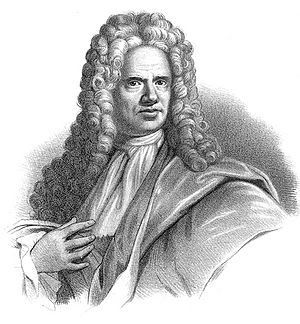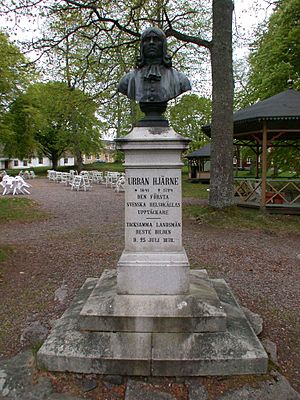Urban Hjärne facts for kids
Urban Hjärne (born December 20, 1641 – died March 10, 1724) was a very smart Swedish person. He worked as a chemist, a geologist (someone who studies rocks and the Earth), a physician (doctor), and a writer.
Contents
Urban Hjärne's Life Story
Early Life and Education
Urban Hjärne was born in a place called Skworitz, near Nyenschantz in Swedish Ingria. His father was a vicar named Erlandus Jonæ Hiærne, and his mother was Christina Tomasdotter Schmidt.
In 1655, Urban started high school in Dorpat. He continued his studies in Arva until 1657. Then, in 1658, he went to Uppsala University. He began studying medicine there in 1661. To learn even more, he spent several years visiting the best medical research centers in Northern Europe. He traveled to the Netherlands, England, and France. In 1670, he earned his doctor of medicine degree in Angers, France.
Career and Achievements
In 1674, Urban Hjärne started working as a doctor in Stockholm. He mostly treated important people like the aristocracy.
He was recognized for his smart work early on. In 1669, he was chosen to be a Fellow of the Royal Society, which is a group of important scientists. In 1684, he became the main doctor for King Charles XI of Sweden. He was also made a nobleman in 1689, which meant he gained a higher social rank.
Urban Hjärne also worked in other important areas. In 1675, he became an assessor (a kind of advisor) for the Board of Mines (Bergskollegium). This group dealt with mining and minerals. In 1683, he became the head of the Laboratorium Chemicum, which was a special place for chemical research.
Fighting Against Witch Trials
Urban Hjärne is also well-known in Sweden for standing up against witch trials. These were times when people were accused of being witches, often without real proof. He was part of the Witchcraft Commission during the Katarina witch trials in 1676.
During these trials, many people believed children who claimed others were witches. But Urban Hjärne and some other members of the commission started to have doubts. They thought that the children might be lying. Because of their questions and skepticism, the child witnesses were eventually found to be dishonest. This led to the end of the Katarina witch trials, the Witchcraft Commission, and eventually, the entire witch hunt in Sweden. He is remembered for helping to stop this unfair practice.
Personal Life
Urban Hjärne loved books and learning. He built a huge research library with 3,500 books, which was one of the biggest in Sweden at that time.
He was married three times: first to Maria Svahn, then to Catharina Elisabeth Bergenhielm, and finally to Elisabeth Carlsdotter. Urban Hjärne passed away in Stockholm in 1724. He was buried at Bromma Church.
 | Aaron Henry |
 | T. R. M. Howard |
 | Jesse Jackson |



